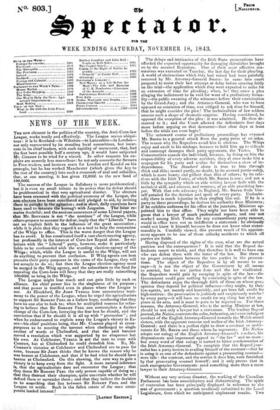NEWS OF THE WEEK.
Tan new element in the politics of the country, the Anti-Corn-law League, works busily and effectively. The League seems ubiqui- tous: it is in Scotland—in Wiltshire—in Lancashire—in London— not only represented by its standing local committees, but incar- nate in its chief leaders, with such rapidity of movement, that, had the feat been possible half a century ago, it would have subjected Mr. COBDRN to be tried for a wizard. In other respects his ex- ploits are scarcely less marvellous: he not only converts the farmers to Free-traders, and bestows seats for London and Kendal on his proteg6s, but he has worked Manchester (which gives the key to the rest of the country) into such a crescendo of zeal and subsidies, that, at one meeting, it has given 12,600/. to the new fund of 100,000/.
The success of the League in Salisbury is more problematical ; but it is even no small tribute to its power that its defeat should be problematical in that very agricultural district. The electors have been crammed with the political economy of the League, the non-electors have been conciliated dill pledged to aid, by Inviting them to partake in the agitation; andin sbort, daily exertions have been used to saturate the boroug'l with Leasuism. The issue res mains doubtful; and the anxious assurances of some Liberal papers, Abet Mr. BC/UTERI& is not "the nominee" of the League, while -others prepare to account for defeat, imply that the " Liberals " have not an implicit faith in the influence of the great association ; while it is plain that they regard it as a tool to help the restoration of the Whigs to office. This is the worst danger that the League has to avoid. It has constituted itself a vast electioneering agency, but professedly in the interest of Corn-law Repeal alone. Its re- lations with the " Liberal" party, however, make it particularly liable to be confounded with the standing election-agency of the Whigs ; which, while the League is useful to the Whigs, will not do anything to prevent that confusion. If Whig agents can best promote their party purposes in the name of the League, they will not scruple to do so; but then the League election-agency must be merged in the Whig agency, and the subscribers to the fund for repealing the Corn-laws will fancy that they are really subscribing 100,000/. to bring in the Whigs. The League might lose much and can gain little by such an alliance. Its chief power lies in the singleness of its purpose ; and that power is testified even in places where the League is not. At Hinckford, Sir JOHN TYRELL bore unconscious testi- mony to the power of the League, when he urged the agriculturists to support Sir ROBERT PEEL as a forlorn hope, confessing that they have no one else to look to; when he multiplied reasons for refus- ing to believe that Sir Roaster PEEL can contemplate a further change of the Corn-law, betraying the fear lest he should, and the conviction that if he should it is all up with " protection" ; and when he endeavoured to explain away the League's victory in Es- sex—his chief positions being, that Mr. COBDEN played at cross- purposes as to meeting the baronet when challenged to single combat of words at Chelmsford, and that tbe said baronet moved a resolution which was aupported by no eloquence but his own. At Colchester, Trams, Is not the man to cope with COBDEN, but at Chelmsford he could demolish him. So, Mr. COBDEN'S victories at Colchester and Chelmsford are to pass for none, because Sir JOHN thinks that he knows the reason why he was beaten at Colchester, and that if he had tried be should have beaten at Chelmsford. On this showing, the sure way to gain a victory is to keep away from the fight. A more natural inference is, that the agriculturists dare not encounter the League ; that they deem Sir ROBERT PEEL the only person capable of doing so ; that they distrust their champion, quite uncertain whether he will defend them or surrender them ; and that they believe the decision to be something that lies between Sir ROBERT PEEL and the League td settle. Such is the fallen estate of the once omni- potent landed interest !
























